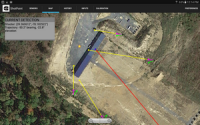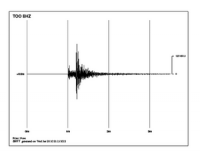-
Gunshot localization system improves emergency services response to active shooter events

Kathleen Griggs is president of Databuoy. Databuoy Corporation began in 2006 as a defense contracting company specializing in event-driven command and control operations. It has now realigned itself to focus on public safety in the private sector. Databuoy Corporation’s ShotPoint gunshot localization system is a technology aiming to improve the response of emergency services to an active shooter event. ShotPoint uses networked acoustic sensors that automatically detect, locate, and reports the exact time and location of the source of gunfire.
-
-
Gun violence research dramatically underfunded, understudied compared to other leading causes of death in U.S.

More than 30,000 people die each year from gun violence in the U.S., a higher rate of death than any industrialized country in the world. Funding and publication of gun violence research are disproportionately low compared to other leading causes of death in the United States, according to new research.
-
-
Lawmakers want to know more about Ricin mix-up

Members of the Committee on Homeland Security sent a letter on 23 December to FEMA administrator Craig Fugate, demanding answers on how many years had first responders unknowingly trained with toxic Ricin at Anniston’s Center for Domestic Preparedness (CDP). In a three-page letter, members of the committee demanded answers for twelve questions, addressing the issue of how lethal toxin was used and the agency’s response once it found out about the mix-up.
-
-
Anti-surveillance clothing blocks security cameras’ facial-recognition software
New anti-surveillance clothing has been developed, allowing wearers to prevent security cameras which use facial recognition technology from recognizing them. The clothing uses complex colored patterns of digitalized faces, and parts of faces, to overload and trick facial recognition software.
-
-
U.K. to develop laser directed energy weapons
The U.K. Ministry of Defense (MOD) has awarded £30 million contract to produce Laser Directed Energy Weapon (LDEW) Capability Demonstrator to U.K. Dragonfire consortium, led by MBDA. The project will assess innovative LDEW technologies and approaches, culminating in a demonstration of the system in 2019. The contract will assess how the system can pick up and track targets at various ranges and in varied weather conditions over land and water, to allow precision use.
-
-
Attackers can make it impossible to dial 911
It’s not often that any one of us needs to dial 911, but we know how important it is for it to work when one needs it. It is critical that 911 services always be available – both for the practicality of responding to emergencies, and to give people peace of mind. But a new type of attack has emerged that can knock out 911 access. These attacks can create extremely serious repercussions for public safety.
-
-
Elbit Systems, NOA secure Uruguay municipalities
Uruguay recently inaugurated a $20 million video surveillance monitoring center using Israeli technologies from NOA security and Elbit Systems. The Maldonado District Administration in Uruguay turned to Israeli technology for the Safe District project, that spans across six municipal authorities including the well-known Punta Del Este tourist resort.
-
-
Israel’s coming chemical weapons crisis
One of the more iconic and sobering elements of Israeli reality were the gas masks distributed on the street or at post offices to every citizen after Saddam Hussein fired SCUD missiles at Israel during the 1991 Gulf War. They continued to be distributed until early 2014, when the Israeli government decided to end the practice in the wake of an international deal to disarm Syria of its chemical weapons stockpiles. Now, nearly three years later, the issue has resurfaced as a direct result of the Syrian civil war—in particular, the threat from both Hezbollah and the Islamic State.
-
-
Black men nearly 3 times as likely to die due to police action
A new study found that black males are nearly three times as likely to be killed by police action as white males, while Hispanic males are more than one-and-a-half times as likely to fall victim. The study used national death records from the Centers for Disease Control and Prevention (CDC)’s Wide-Ranging Online Data for Epidemiology Research (WONDER) database from 2010-2014. The study found that, of the 2,285 deaths attributed to law enforcement action over that five-year period (1.5 deaths per million in U.S. population per year), 96 percent occurred among males 10 years or older.
-
-
Devastating wildfires in Eastern forests likely to be repeated

The intense wildfires that swept through the Smoky Mountains in Tennessee late last month were a tragic melding of the past and the future. The fast-moving, wind-whipped blazes that burned more than 150,000 acres, killed fourteen people and damaged 2,400 structures in Gatlinburg and Sevier County may be a portent of things to come.
-
-
Quake-detection app recorded nearly 400 temblors worldwide

UC Berkeley’s worldwide network of smartphone earthquake detectors has recorded nearly 400 earthquakes since the MyShake app was made available for download in February, with one of the most active areas of the world the fracking fields of Oklahoma. The Android app harnesses a smartphone’s motion detectors to measure earthquake ground motion, then sends that data back to the Berkeley Seismological Laboratory for analysis. The eventual goal is to send early-warning alerts to users a bit farther from ground zero, giving them seconds to a minute of warning that the ground will start shaking.
-
-
Thermal sensor provides warning for firefighter safety
The conditions inside a burning building are perilous and can change rapidly. For firefighters searching for people trapped within a burning building, these risks can be exacerbated in a matter of seconds as exposure to high temperature may cause their personal protective equipment (PPE) to fail. This is particularly true in the presence of infrared radiation, which can rapidly increase the temperature of a firefighter’s environment without warning. DHS S&T is now working with partners to develop the Burn Saver Thermal Sensor, a battery-powered device that will be carried by firefighters and detects thermal changes in their operating environments.
-
-
The origins of Tennessee’s recent wildfires

Wildfires raged recently through the foothills of Tennessee’s Great Smoky Mountains, fueled by severe drought and high winds in the eastern part of the state. The fires damaged or destroyed more than 1,400 structures, including homes, chapels, and resort cabins. Fourteen people were killed, and nearly 150 others were injured. Last week, two juveniles were taken into custody and charged with aggravated arson in connection with the deadly wildfires – but sources such as Climate Central suggested that rising temperatures may have played a role in the fires. Does climate change play a role in determining the frequency and intensity of wildfires?
-
-
Calls in Germany for bolstering surveillance in wake of Berlin attack
Klaus Bouillon, the interior minister in the German state of Saarland, said that “It is time to eliminate the barriers to monitoring suspects’ telephone conversations.” He also urged the revamping of a law for monitoring popular online encrypted messaging services, such as WhatsApp, and said that next month he would make a formal proposal to that effect. Bouillon, a member of Chancellor Angela Merkel’s Christian Democratic Union (CDU), said, “It cannot be the case that a company can make billions with WhatsApp, while at the same allowing criminals to organize, direct young people and obstruct our authorities by not providing the necessary encryption codes.”
-
-
Berlin attack: security intelligence has limits in preventing truck-borne terror
The Christmas market truck assault in Berlin, which has left twelve dead and dozens injured, is a disturbing echo of the truck-borne attack on Bastille Day celebrants on the Nice promenade in July. How could such events be allowed to happen? Why weren’t intelligence agencies in Germany and France able to stay one step ahead of the perpetrators? The role of the security and intelligence agencies to remain vigilant and seek to monitor extremist elements will undoubtedly endure. The secret of their success will continue to be keeping their successes secret. However, this does not absolve the rest of society from remaining engaged in community, by being inclusive, welcoming, and helpful, while also maintaining a level of vigilance many had come to associate with a bygone era.
-
More headlines
The long view
Factories First: Winning the Drone War Before It Starts
Wars are won by factories before they are won on the battlefield,Martin C. Feldmann writes, noting that the United States lacks the manufacturing depth for the coming drone age. Rectifying this situation “will take far more than procurement tweaks,” Feldmann writes. “It demands a national-level, wartime-scale industrial mobilization.”
How Male Grievance Fuels Radicalization and Extremist Violence
Social extremism is evolving in reach and form. While traditional racial supremacy ideologies remain, contemporary movements are now often fueled by something more personal and emotionally resonant: male grievance.
The Surprising Reasons Floods and Other Disasters Are Deadlier at Night
It’s not just that it’s dark and people are asleep. Urban sprawl, confirmation bias, and other factors can play a role.
Why Flash Flood Warnings Will Continue to Go Unheeded
Experts say local education and community support are key to conveying risk.
